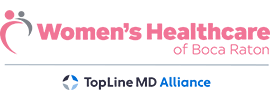Disclaimer: Please note that this blog is for educational purposes only, it includes general information on health-related topics. Women’s Healthcare of Boca Raton is giving medical advice to Patients Only. Follow this link to request an appointment with Dr. Ellman.
The first six weeks after giving birth is referred to as the postpartum period. Although this period is filled with bliss and joy because of the newborn baby, there are specific steps a woman needs to take for a successful postpartum recovery.
Scheduling regular checkups with your chosen medical provider is a priority. Still, there are additional challenges and tasks new mothers will face, so we are bringing advice and information that you might find helpful during after-birth care.
When picking the most efficient and safe postpartum care service, make sure to investigate all of your options. Dr. Ellman from Women’s Healthcare of Boca Raton is one of the most successful professionals when it comes to helping women take care of their postpartum health, so before choosing, you need to decide what kind of skills and expertise your doctor has to possess.
Post Pregnancy – What to Expect?

It is very common to experience different symptoms and changes during postpartum recovery. Below you can read about potential occurrences, which are not limited to only these, and it is essential to emphasize that every woman experiences the post-pregnancy period differently. Their postpartum health is at different levels.
The Body
During pregnancy and after you give birth, numerous changes happen to and in the body, from weight gain to internal changes in your reproductive system. Below is a list of potential issues and some postpartum recovery tips for your body.
- Weight gain: Usually most women experience significant weight gains during pregnancy and losing weight is one of the most talked about after-birth care tasks for women. It is essential to remember that losing weight does not occur overnight and that exercising is not an option for all women during their postpartum recovery.
Eating well involves balanced meals and a lot of protein, fiber, and healthy fats, so take your time while preparing your meals and try to enjoy the process. If exercising is not an option you want to pursue, walking, swimming and yoga are also good methods for weight loss but also for improving your well-being, in general.
- Breast enlargement: Breastfeeding is something most women engage in during the postpartum period. The mother’s breasts will be full of milk for the first few days after the delivery, but that will improve over time. The swelling of the breasts can be unpleasant in any case, so it is recommended to put warm or cold towels on the area to soothe the discomfort.
Also sometimes nipples can be sore and cracked, so doctors recommend nipple creams. The baby often does not suck the milk out in the correct manner, so there are ways to find the best breastfeeding position which will work for both you and the infant.
- Reproductive health issues: Pelvic floor problems, uterine pains, vaginal bleeding and discharge, hormonal changes or soreness are not uncommon during the after-birth care period. When it comes to the perineum issues and tearing during childbirth, putting ice, sitting on a pillow, and performing Kegel exercises will definitely speed up your recovery.
Uterine pains occur because the uterus is shrinking postpartum. This can cause cramps which are painful but stop happening after some time. There are safe medications that help with the pain, so contact your chosen medical professional for advice and the right prescription. Also, if you are experiencing abdominal pains, put a heated pad on the belly to reduce the pains.
Vaginal discharge and bleeding are other symptoms that are very common during the period after giving birth. The discharge is a way for the body to clean itself from any tissue and postpartum blood residue, which can continue to occur for six weeks. It is advised to you to use sanitary pads rather than any other products to avoid infections. Please contact your doctor if the bleeding becomes heavy or the discharge is ill-smelling.
The body can go through changes when it comes to hormonal balance as well. Due to this, you can experience hair loss, extensive sweating, or mood changes. Over time these symptoms disappear, but it is essential to monitor them over time.
After giving birth, women can experience soreness between the vagina and the anus, which causes discomfort. This can last up to a few weeks, so applying ice daily can ease the pain and clean the area regularly.
Constipation is another symptom that might appear during this period. Eating foods high in fiber can help with bowel movements, and please remember to keep yourself hydrated. In case you have hemorrhoids, there are creams you can use to battle this condition and sitz baths.
The Mind

When it comes to postpartum recovery tips concerning mental health, they are primarily in connection to the adjustments the mother needs to make to accommodate the presence of an infant in her daily life.
- Take care of yourself: Although the primary task of new mothers after giving birth is to take care of their child, it is essential that they also take care of themselves. Getting rest whenever possible to be able to cope with the lack of sleep during the night is crucial. Also, meditation or yoga can help with stress and anxiety.
Asking for help from your family and friends can be immensely helpful during the first few months of your new life. You need time to heal physically and mentally, and any additional help will be beneficial and much needed.
- Practice patience and effective communication: Many new mothers want to be perfect in every way possible. It is essential not to forget that this is an entirely new experience for you, and you are entitled to make mistakes. Be patient with yourself. Also, this might be a unique experience for other people in your surrounding, so practice kind communication and express your needs in an assertive, respectful manner to avoid stress and misunderstandings.
- Baby blues: Almost 80% of new mothers experience baby blues, or the sense of sadness after coming home from the hospital. The symptoms include irritability, insomnia, mood swings, sadness, crying, anxiety, and alike. This period does not usually last longer than a few weeks, and it occurs due to the change in hormones.
If this continues occurring after a few weeks, you might be suffering from postpartum depression. Additional symptoms that might occur are guilt, loss of interest in everyday activities, withdrawal from the family, lack of interest in the baby, etc. This condition requires a consultation with a medical professional and medical treatment, so contact your doctor as soon as possible.
We Are Here for You!
Dealing with postpartum recovery is a heavy task for a new mother. Contacting your doctor to help you deal with issues will become a major part of your recovery process, so choosing an experienced doctor is crucial. Our expert team has helped hundreds of new mothers get back on track after their pregnancy, so we are ready to support you every step of the way. Call us!

Dr. Ellman is a Board Certified OBGYN who established his medical practice in South Florida over 25 years ago. His office, Women’s Healthcare of Boca Raton, is located in Boca Raton, Florida at West Boca Medical Center. Dr. Ellman attended Albert Einstein College of Medicine of Yeshiva University, where he received his medical degree. He went on to intern at Beth Israel Hospital in Boston- an affiliate of Harvard Medical School- and continued his residency at North Shore University Hospital in Manhasset, New York- an affiliate of Cornell Medical School.
Dr. Ellman has practiced Obstetrics and Gynecology in the Boca Raton area since 1995. In addition to treating patients at West Boca Hospital, Dr. Ellman also treats patients through his own private practice, Women’s Healthcare of Boca Raton, located on the West Boca Medical Campus.

